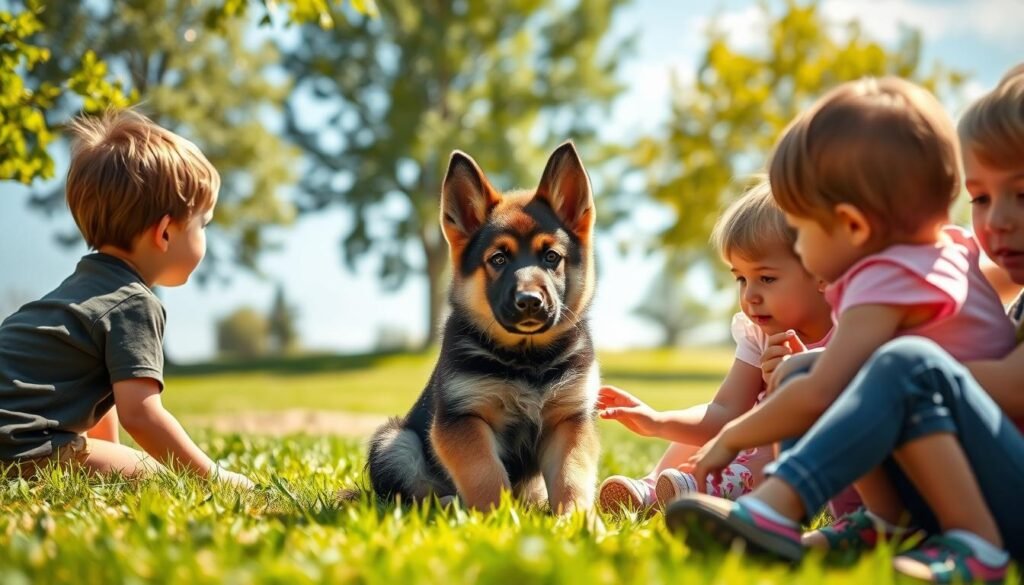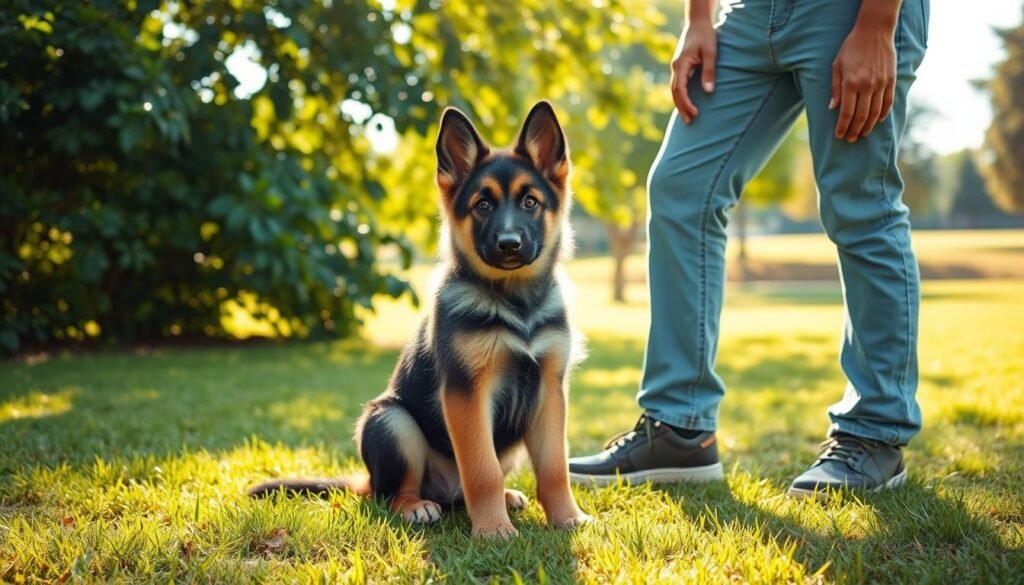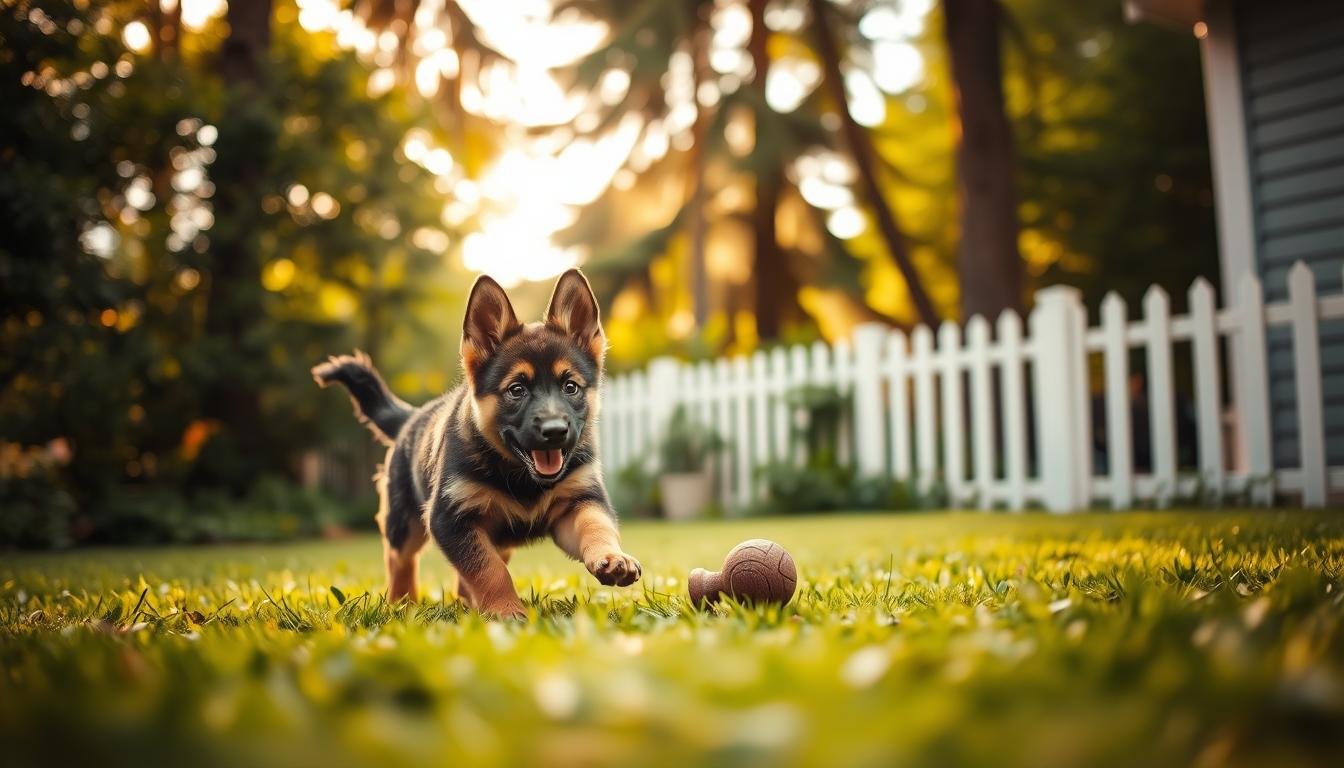The Best and Worst Behaviors in German Shepherd Puppies
As a prospective or new owner of a German Shepherd puppy, you’re likely aware of their intelligence, loyalty, and trainability. However, you might be wondering what to expect from your new furry friend in terms of behavior.
Understanding the natural temperament of your German Shepherd pup is crucial for raising a well-balanced and happy dog. As you’ll discover, their behaviors can range from delightful to challenging, but with the right training approach, you can nurture the best qualities in your puppy.
Key Takeaways
- Understand the natural temperament of German Shepherd puppies.
- Learn effective training methods for positive reinforcement.
- Discover how to address common behavioral challenges.
- Find out how to nurture the best qualities in your German Shepherd pup.
- Understand the importance of consistent training and socialization.
Understanding German Shepherd Puppies
To truly appreciate a German Shepherd puppy, it’s essential to delve into its origins and natural traits. This understanding will not only deepen your bond with your puppy but also help you tailor your care and training to meet its specific needs.
Origin and Breed History
The German Shepherd breed originated in Germany in the late 1800s, developed by Captain Max von Stephanitz, who sought to create a superior herding dog. By crossing various herding dogs, he produced a breed known for its intelligence, strength, and loyalty. The Shepherd quickly gained popularity for its versatility and trainability, soon becoming a favorite for military and police work.
Natural Temperament and Characteristics
German Shepherds are known for their confident and courageous nature. They are highly intelligent dogs that thrive on mental and physical stimulation. Their natural protective instincts make them excellent guardians, but they are also capable of being gentle and loving towards their family. With proper socialization, a Shepherd can be a wonderful companion for families.
What Makes German Shepherds Unique
The uniqueness of the German Shepherd breed lies in its combination of intelligence, loyalty, and versatility. These dogs are renowned for their ability to learn complex tasks and adapt to various roles, from herding to search and rescue. Their strong bond with their owners and their protective nature make them both loving companions and reliable guardians.
The Best Behaviors in German Shepherd Puppies
As a breed, German Shepherd puppies exhibit some of the best behaviors that make them an excellent addition to many families. Their desirable traits make them a popular choice among dog owners, and their ability to adapt to various living situations is just one of the many reasons why.
Intelligence and Trainability
German Shepherds are renowned for their intelligence, ranking among the top breeds in terms of cognitive abilities. They are highly trainable, which makes them excel in various roles, from family companions to service dogs. Their ability to learn complex tasks and commands is impressive, and they thrive when given mental stimulation and training exercises.
Loyalty and Protective Nature
One of the most cherished traits of German Shepherd puppies is their loyalty. They form strong bonds with their family members and are naturally protective of them. This loyalty, combined with their protective nature, makes them excellent watchdogs. However, it’s essential to socialize them well to ensure they don’t become overly aggressive or protective.
Adaptability and Versatility
German Shepherd puppies are remarkably adaptable, adjusting easily to different living situations, from rural areas to urban apartments, as long as their exercise needs are met. They are versatile dogs that can excel in various activities, including search and rescue, police work, and competitive dog sports. Some key aspects of their adaptability include:
- Adjusting energy levels to match the activity at hand
- Learning different tasks and commands for various household roles
- Responding well to positive reinforcement training techniques
- Thriving in different weather conditions due to their double coat
Overall, German Shepherd puppies display a range of excellent behaviors that make them a popular and rewarding breed to own. Their intelligence, loyalty, and adaptability are just a few reasons why they are considered one of the best breeds for many families.
Positive Traits That Make German Shepherds Great Family Pets
With proper training and socialization, German Shepherds can become a loving and integral part of your family. Their ability to form strong bonds with family members is one of their most endearing qualities.
Affection Towards Family Members
German Shepherds are known for their loyalty and affection towards their family. They thrive on interaction and become deeply attached to their owners. As quoted by a renowned dog trainer, “German Shepherds are not just pets; they are family members who shower their loved ones with loyalty and affection.” This breed is particularly suited to families who can provide the necessary attention and engagement.
Compatibility with Children and Other Pets
When properly socialized from an early age, German Shepherds develop excellent relationships with children, often becoming their most loyal protectors and playmates. They can learn to be gentle and adjust their play style to suit children of different ages. Moreover, German Shepherds can coexist peacefully with other pets, including cats and smaller dogs, especially when introduced at a young age. Their intelligence allows them to understand different rules for interacting with various family members and pets.
By understanding and nurturing these positive traits, you can create a harmonious household where your German Shepherd feels like a true member of the family.
Early Signs of Intelligence in Your German Shepherd Puppy
Intelligence is a hallmark of the German Shepherd breed, and it becomes apparent early in a puppy’s life. As you bring your German Shepherd puppy home, you’ll likely notice various signs of their burgeoning intelligence.
Problem-Solving Abilities
One of the key indicators of intelligence in German Shepherd puppies is their problem-solving abilities. These puppies are naturally curious and often figure out ways to overcome obstacles. For instance, they might learn to open simple latches or find hidden treats. This innate ability to solve problems is a strong sign of their intelligence and adaptability.
Observing your puppy’s problem-solving skills can be both entertaining and enlightening. You might notice them figuring out how to get to a treat that’s just out of reach or finding a way to escape from a confined space. These moments are not just cute; they’re indicators of a highly intelligent and resourceful dog.
Quick Learning and Command Retention
German Shepherd puppies are known for their quick learning abilities and excellent memory. They can master new commands in just a few repetitions, often outperforming other breeds. Here are some signs of their quick learning and command retention:
- They can learn new commands in as few as 5-10 repetitions.
- Their exceptional memory allows them to retain commands even after long periods without practice.
- They can associate words with specific objects or actions, building an impressive vocabulary.
- During training, they’ll often watch you intently, showing their focus and eagerness to learn.
- Their ability to generalize learning means they can apply commands in different settings.
These traits make German Shepherd puppies highly trainable and responsive to commands. Their intelligence, combined with their eagerness to please, makes training a rewarding experience for both you and your puppy.
The Worst Behaviors in German Shepherd Puppies
Understanding the worst behaviors in German Shepherd puppies is crucial for effective training and a harmonious home environment. As a breed, German Shepherds are known for their intelligence and loyalty, but like any puppy, they can exhibit challenging behaviors that need to be addressed early on. Proper training and socialization are key to mitigating these issues.
Excessive Chewing and Destructive Tendencies
German Shepherd puppies are notorious for their love of chewing, which can lead to destructive tendencies if not properly managed. Providing your puppy with plenty of chew toys and keeping a close eye on them can help redirect this behavior. Consistent training and ensuring they have enough physical and mental stimulation are crucial.
Nipping and Biting Behaviors
Nipping and biting are common behaviors in German Shepherd puppies, largely due to their natural herding instinct. It’s essential to teach your puppy that nipping and biting are not acceptable behaviors. Using positive reinforcement techniques, such as offering toys instead of human skin, can help curb these behaviors. Your attention to their needs and consistent training will help minimize nipping.
Excessive Barking and Vocalization
German Shepherd puppies are naturally vocal dogs, using barking, whining, and other vocalizations to communicate their needs and alert to changes in their environment. Their protective instincts can lead to alert barking at unfamiliar sounds, people, or animals, which can become excessive without proper training. Ensuring your puppy gets enough attention and exercise can help reduce excessive barking.
Early training to manage vocalization is important, as a full-grown German Shepherd has a powerful, loud bark that can disturb household members and neighbors. By addressing these behaviors early, you can help your German Shepherd become a well-behaved and well-adjusted member of your family.
Common Behavioral Challenges with German Shepherd Puppies
Bringing home a German Shepherd puppy can be a joyful experience, but it’s essential to be prepared for the potential behavioral challenges that may arise. As a responsible dog owner, understanding these challenges is crucial to raising a well-behaved and well-adjusted pet.
Separation Anxiety Issues
German Shepherd puppies can suffer from separation anxiety, a condition where they become distressed when left alone. This can lead to destructive behaviors, such as chewing furniture or digging. To mitigate this, you can start by leaving your puppy alone for short periods and gradually increase the duration.
Overprotectiveness and Territorial Behavior
German Shepherds are naturally protective of their territory and family. However, this can sometimes manifest as overprotectiveness or aggression towards strangers. Socialization is key to addressing this issue. Expose your puppy to various environments, people, and other animals to help them become confident and calm in new situations.
High Energy Levels and Restlessness
German Shepherd puppies possess remarkably high energy levels that require appropriate outlets to prevent restlessness and problematic behaviors. Their working dog heritage means they have natural stamina and drive that needs to be channeled through structured activities and exercise. Some effective ways to manage their energy include:
- Engaging in regular physical activity, such as walks and playtime.
- Providing mental stimulation through puzzle toys and training exercises.
- Establishing a consistent routine that includes appropriate exercise and training sessions.
By understanding and addressing these common behavioral challenges, you can help your German Shepherd puppy grow into a well-behaved and loving companion.
Understanding the Root Causes of Problematic Behaviors
Problematic behaviors in German Shepherd puppies can stem from a combination of genetic, environmental, and training-related factors. To effectively address these issues, it’s crucial to understand their underlying causes.
Several factors contribute to the development of problematic behaviors in Shepherd puppies. These include:
Genetic Factors
German Shepherd puppies may inherit certain traits from their parents that can influence their behavior. Genetic factors can predispose them to specific characteristics, such as high energy levels or protective instincts, which, if not properly managed, can lead to behavioral problems.
Environmental Influences
The environment in which a Shepherd puppy grows can significantly impact its behavior. Factors such as the puppy’s living conditions, exposure to various stimuli, and interactions with family members and other animals play a crucial role in shaping its behavior.
Lack of Training or Socialization
Insufficient training and socialization are primary causes of problematic behaviors in German Shepherd puppies. Without proper training, these intelligent and energetic dogs can develop undesirable behaviors. Similarly, inadequate socialization during the critical period can result in fear-based behaviors and other issues.
By understanding these root causes, you can take the first step towards addressing behavioral problems and fostering a well-behaved and well-adjusted Shepherd.
Effective Training Approaches for German Shepherd Puppies
Training a German Shepherd puppy requires a thoughtful approach to bring out their best qualities. As a breed known for their intelligence and loyalty, German Shepherd puppies respond well to structured training methods that cater to their developmental stage.
One of the most effective ways to train your German Shepherd puppy is through positive reinforcement techniques. This involves rewarding desired behaviors with treats, praise, and affection, rather than punishing undesired ones.
Positive Reinforcement Techniques
Positive reinforcement is a powerful training tool. By focusing on rewarding good behavior, you encourage your puppy to repeat those actions. For example, when your puppy sits on command, reward them with a treat and praise. This approach helps build trust and strengthens the bond between you and your puppy.
Consistency and Clear Boundaries
Consistency is key when training a Shepherd puppy. Establishing clear boundaries and being consistent in your commands and expectations helps your puppy understand what is expected of them. It’s also essential to ensure all family members are on the same page to avoid confusing your puppy.
Age-Appropriate Training Methods
As your German Shepherd puppy grows, their training should adapt to their age and developmental stage. For young puppies (8-16 weeks), keep training sessions short, fun, and focused on basic skills. As they mature, you can gradually increase the duration and complexity of the training.
Understanding your puppy’s cognitive and physical development is crucial for setting realistic expectations and avoiding frustration during training. By tailoring your approach to their age and individual needs, you can help your German Shepherd puppy become a well-behaved and loyal companion.
First Steps in Training Your German Shepherd Puppy
The first steps in training your German Shepherd puppy are crucial for their development. Establishing a strong bond between you and your puppy is fundamental to successful training.
Essential Commands to Teach First
Teaching your German Shepherd puppy essential commands is a vital part of their training. Start with simple commands like “sit,” “stay,” and “come.” These commands will help you establish a line of communication with your pup and lay the groundwork for more complex instructions. By focusing on positive reinforcement techniques, such as treats and praise, you can encourage your German Shepherd to learn quickly and effectively.
Establishing Leadership and Trust
Establishing yourself as a calm, confident leader is critical in helping your German Shepherd puppy feel secure and understand their place within the family. This involves providing consistent guidance, setting clear boundaries, and being predictable in your responses. By doing so, you build trust with your pup, which is essential for effective training and communication.
To further enhance your relationship with your dog, spend quality time together through play, training, and quiet moments. Avoid harsh corrections or punishment, as they can damage trust. Instead, focus on redirecting unwanted behaviors and rewarding desired ones, reinforcing your role as a leader and strengthening your bond with your shepherd.
Socialization: The Key to a Well-Behaved German Shepherd
Socialization is a critical component in the development of a well-behaved German Shepherd. It’s the process by which your puppy learns to interact with the world around them, developing essential skills that will benefit them throughout their life.
Exposure to Different People and Environments
Exposing your German Shepherd puppy to various people, environments, and situations helps them become confident and calm in new situations. This exposure can include visits to parks, pet stores, and different neighborhoods, as well as meeting new people and encountering different noises and objects.
Interactions with Other Dogs and Animals
Interactions with other dogs and animals are crucial for your German Shepherd puppy. Controlled, positive interactions with dogs of various sizes, ages, and play styles help develop appropriate canine social skills. Puppy socialization classes and supervised play dates with well-vaccinated, behaviorally sound dogs provide valuable learning experiences. Exposure to other animals, including cats, livestock, and small pets, helps prevent prey drive issues and teaches appropriate interspecies boundaries.

By observing your puppy’s interactions, you can identify their natural tendencies and address potential issues before they become problematic. Teaching your puppy to remain calm and focused on you, even in the presence of other animals, is an important skill that prevents reactive behaviors. Proper socialization channels your German Shepherd’s natural herding instincts appropriately, preventing unwanted behaviors like chasing or nipping.
Mental Stimulation Games and Activities
Engaging your German Shepherd puppy’s mind is just as important as exercising their body. Mental stimulation games and activities play a vital role in their development, discipline, and overall happiness. These activities help to engage their minds, build problem-solving skills, and can even be used to combat boredom and destructive behavior.
Engaging Puzzle Toys
Puzzle toys and problem-solving games are excellent ways to challenge your German Shepherd puppy’s intelligence. By hiding treats or toys, you can encourage your puppy to use their problem-solving skills to find them. This type of mental stimulation is essential for their cognitive development and can be a fun way to bond with your puppy.
- Hide-and-seek games help your German Shepherd practice their scent-tracking skills.
- Puzzle toys filled with treats challenge your puppy to figure out how to get them out.
- Interactive games that require your puppy to practice basic commands like sit, stay, and come are also beneficial.
Intelligence-Challenging Training Exercises
Training exercises that challenge your German Shepherd puppy’s intelligence are crucial for their mental development. Advanced training exercises, such as teaching your puppy to identify objects by name and retrieve specific items on command, can be very effective. Trick training is another way to engage your puppy’s problem-solving abilities while providing a fun way to bond and show off their intelligence.
- Teaching multi-step tasks provides excellent mental stimulation that satisfies their working dog instincts.
- Scent discrimination exercises tap into their natural abilities while providing challenging mental work.
- Agility training combines physical exercise with mental challenges as your puppy learns to navigate obstacles according to your directions.
Physical Exercise Needs for a Balanced Puppy
To keep your German Shepherd puppy balanced, you must ensure they receive the right amount of physical exercise. German Shepherds are work dogs, and they need a job to do. If they’re not given an appropriate outlet for their energy, they can become bored, and boredom can lead to destructive behaviors.
Daily Exercise Requirements
Your German Shepherd puppy needs daily exercise tailored to their age and developmental stage. For young puppies (8-16 weeks), focus on short play sessions and gentle exploration. As they grow (4-8 months), they can handle longer walks on soft surfaces and interactive play. It’s essential to avoid high-impact exercises until their growth plates close around 18-24 months.
- Short play sessions for young puppies
- Longer walks on soft surfaces for medium-aged puppies
- Avoiding high-impact activities until growth plates close
Age-Appropriate Activities
Age-appropriate activities are crucial for your German Shepherd puppy’s development. For instance, swimming is an excellent low-impact exercise for puppies over 4 months old, building muscle without stressing their joints. Structured play with appropriate toys also helps channel their energy while teaching impulse control. Gentle hiking on natural surfaces provides mental stimulation and builds endurance.
Addressing Specific Behavioral Problems
As your German Shepherd puppy grows, addressing specific behavioral problems is crucial for a harmonious household. German Shepherd puppies, like any other breed, can develop undesirable behaviors if not properly trained and socialized.
Dealing with Excessive Chewing
Excessive chewing is a common issue in German Shepherd puppies. To address this, it’s essential to provide your puppy with plenty of chew toys and to redirect their attention away from undesirable objects. When redirecting your pup, remain firm yet gentle, using commands like “no” or “leave it.” Consistency is key to breaking the chewing habit.
Managing Nipping and Biting
Nipping and biting are natural behaviors for puppies, but they can be problematic if not managed. To manage nipping and biting, it’s crucial to teach your German Shepherd puppy bite inhibition. This can be achieved by allowing your puppy to mouth your hands and then gradually teaching them to be gentle.
Reducing Separation Anxiety
Separation anxiety is a common issue in German Shepherd puppies, causing distress for both the puppy and the owner. To reduce separation anxiety, you can try the following:
- Gradually desensitize your puppy to your departures by starting with brief absences.
- Create positive associations with your departures using special treats or puzzle toys.
- Establish a calm departure routine to avoid signaling anxiety.
By following these steps and being consistent, you can help alleviate your German Shepherd puppy’s separation anxiety and promote a more balanced and calm demeanor.
When to Seek Professional Help
Don’t hesitate to seek professional help if you’re experiencing difficulties with your German Shepherd puppy’s behavior. Many dog owners avoid this step due to fear of being judged, but seeking help is a sign of responsible pet ownership. A professional dog trainer can provide personalized tips and advice tailored to your pup’s needs, helping you and your German Shepherd puppy grow into an amazing team.
Signs That Behavior Issues Are Beyond DIY Training
If you’re noticing persistent behavioral issues in your German Shepherd puppy, such as excessive barking, chewing, or aggression, it may be time to seek professional help. These issues can be challenging to address on your own and may require the expertise of a professional dog trainer or behaviorist. Some signs that you need professional help include:
- Persistent behavioral problems despite consistent training efforts
- Aggression towards people or other animals
- Severe separation anxiety or destructive tendencies
Finding the Right Trainer or Behaviorist
When looking for a professional dog trainer or behaviorist, there are several factors to consider. Look for trainers with specific experience working with German Shepherds, as they’ll understand breed-specific behaviors and effective training approaches. Ensure that the trainer uses positive reinforcement methods and has the necessary certifications from reputable organizations. You can also ask for references or testimonials from previous clients to gauge their effectiveness.
Long-Term Behavioral Development in German Shepherds
As your German Shepherd grows, understanding their long-term behavioral development is crucial for a harmonious relationship. This development is influenced by a combination of genetic, environmental, and training factors.
What to Expect as Your Puppy Matures
As your German Shepherd matures, you can expect significant changes in their behavior. They will transition from the energetic and sometimes destructive puppy phase to a more balanced and calm adult dog. Regular training and socialization play a key role in this transition, helping to prevent behavioral issues.
- Lifelong training keeps their intelligent minds engaged and reinforces your leadership role.
- Ongoing training prevents behavioral regression and maintains reliable responses to commands.
Ongoing Training Throughout Their Lifespan
Ongoing training is essential for German Shepherds, providing mental stimulation and preventing boredom-related issues. Adapting training approaches to your aging German Shepherd’s changing physical capabilities ensures continued mental engagement. Regular training sessions strengthen your bond and enhance your relationship.
- Periodic refresher training addresses emerging behavioral issues before they become established problems.
- Training throughout your German Shepherd’s life enhances your communication and relationship.

Conclusion: Nurturing the Best in Your German Shepherd Puppy
As you embark on the journey of raising your German Shepherd puppy, understanding their behaviors is key to developing a strong, lasting bond. To nurture the best qualities in your puppy, it’s essential to adopt a balanced approach that includes consistent positive reinforcement training and thorough socialization.
Raising a well-behaved German Shepherd requires meeting their physical exercise and mental stimulation needs, which helps prevent common behavioral problems. By recognizing that certain challenging behaviors are normal developmental stages, you can maintain patience during training.
The strong bond you develop through positive training methods creates a lifelong partnership with your Shepherd. With proper care and attention, your German Shepherd puppy can grow into an exceptional companion, exemplifying the best qualities of this remarkable breed. By investing time and effort into addressing behavioral challenges early, you’ll be rewarded with years of companionship with a well-adjusted dog.

